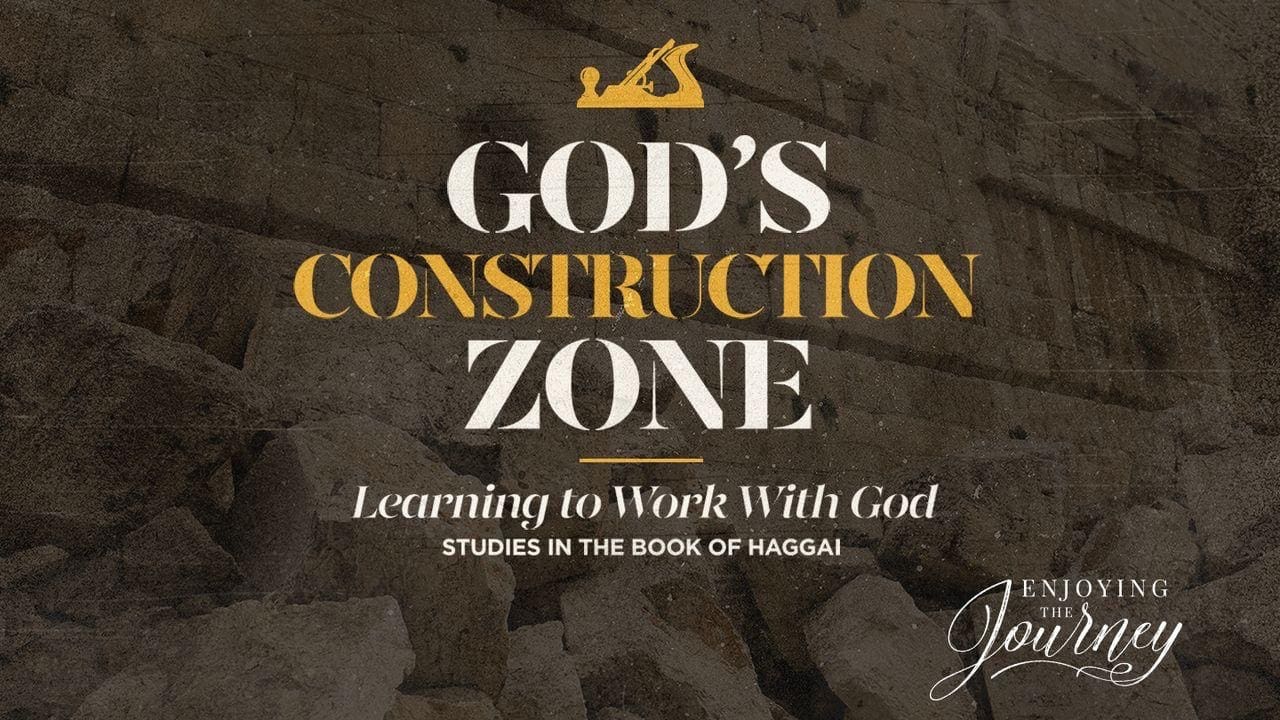
Overview: There is work to do in our homes, churches, and nation. Sin’s work is destruction; God’s work is construction. In Nehemiah, we learn the principles of building up that which has been broken down.
Listen To An Overview Of Nehemiah:
Journey Through Nehemiah
One of the buzzwords in our day is leadership. Now, whether you’re a Christian or not, you can walk into any bookstore and find a huge section of books written on the subject of leadership. The interesting thing is that the greatest book on leadership ever written is found in the Word of God – it is the book of Nehemiah.
Nehemiah: The Spiritual Leader
It is an autobiography of Nehemiah, and it is a history of his dealings with the people of God at a very difficult time. But it is a very practical book. You know, good leadership is both spiritual and practical. And Nehemiah was a spiritual leader. As you walk through Nehemiah, you discover characteristics of spiritual leadership.
10 Characteristics of Spiritual Leadership from Nehemiah:
- He was a man of compassion | “…he sat down and wept” (1:4).
- He was a man of prayer | “I beseech thee, O Lord God of heaven” (1:5).
- He was a man of vision | He saw the work of God that had to be accomplished.
- He was a man of faith | “The God of heaven, he will prosper us” (2:20).
- He was a man of organization | He organized an entire nation into families and 42 different work groups.
- He was a man of hard work | “So built we the wall” (4:6). He didn’t just tell others to do it; he got his hands dirty. He led by example.
- He was a man of vigilance | He set a watch against the enemies day and night (4:9). He was willing to build and battle.
- He was a man of courage | He instructed the people, “Be not afraid of them” (4:14).
- He was a man of rebuke | He was willing to rebuke even the nobles and the rulers among the people (5:7).
- He was a man of determination | “I cannot come to him” (6:3). He refused to be distracted from his duty.
*Click HERE to download a free PDF of these 10 Characteristics of Spiritual Leadership from Nehemiah.
God used Nehemiah’s leadership to rebuild the ruined walls of Jerusalem. In just 52 days, they were completely restored – fully reconstructed from the rubble. How does that happen? God did it. The Lord used a man who was willing to do God’s work, God’s way.
The book of Nehemiah picks up where Ezra left off. (Visit HERE to learn more about Ezra.) There were three returns to the land of Israel, to the city of Jerusalem. Nehemiah brings back the final and smallest of those returns. When he gets there, he discovers the walls of the city are broken down, and he takes it upon himself to raise those walls.
Understanding Nehemiah
Let us give you a little parenthetical truth to help you study the Bible.
The Time In History
As you study, understand that the last three Historical Books (Ezra, Nehemiah, and Esther) of the Old Testament and the last three Prophetical Books (Haggai, Zechariah, and Malachi) of the Old Testament are written in the same period.
Study them together as two parallel tracks. Ezra, Nehemiah, and Esther align with Haggai, Zechariah, and Malachi. God had His workers and His preachers. He had men in the palace and the pulpit. God had men with the trowel and men with the truth.
Amid the work, the Word of God is always preeminent.
Chronologically, this falls near the end of the Old Testament era. After Nehemiah built the walls, they entered 400 silent years, culminating with the New Testament. Biblically and historically, this was a significant time period.
Nehemiah’s name means “comforted of God.” He needed God’s comfort when the opposition came. If you desire to do anything for the Lord, others will not like it. Primarily the devil. Anything God ordains, Satan opposes.
Key Verse
The key verse is found in Nehemiah 2:5, “And I said also under the king, ‘If it please the king, and if my servant have found favor in thy sight, that thou would send me under Judah, under the city of my father’s sepulchers, that I may build it.’”
Nehemiah requested permission from his earthly king, but before he asked that king for permission, he prayed to the King. In the previous verse, Nehemiah prayed to the God of heaven. If God gives you favor, and if God gives you fruit, it won’t be because of man. It will always be because of God.
Nehemiah was not just a get-it-done man. This was a man who believed God was at work, and he wanted to be used by the Lord. Years ago, my pastor said to me, “Scott, there are two kinds of people in this world. There are those who use God, and there are those who let God use them.” Nehemiah was not a man trying to use God to gain advantage or gain position, or comfort. He was willing to simply let the Lord use him, and He did!
Overview of Nehemiah
Nehemiah 1-7: The Work of Construction
In chapters one through seven, there is the work of construction. They’re building the walls, and there’s a beautiful principle there that people work best close to home.
Our work for the Lord should begin close to home. Right with your own family. In your church. Within your community. Build on the wall near where you live. Right where God has you.
Nehemiah 8-10: The Work of Consecration
The people got thoroughly right with the Lord. The covenant between the people and God is sealed. Consecration began with the preaching of the Word of God (Chapter 8). The Word of God is powerful. Ezra stood up and read the Scripture. He gave the sense of it so all could understand.
Notice that the people listened (Nehemiah 8:3). They even shouted, “Amen!” This is appropriate when you hear the truth. However, do not miss the main point. Their response did not end in words; they got on their faces and worshipped God.
No physical work is important if we neglect the spiritual work. It is easy to do the things you can see, but sometimes the intangibles are more difficult.
Nehemiah 11-13: The Work of Consolidation
Nehemiah worked hard to ensure that the nation of Israel was prepared for its future. He longed for them to be ready for all God had in store for them. The great message of Nehemiah is this: build up what is broken down. Laboring together to accomplish the work of God. May I ask you, what’s broken down in your life today?
Is there something broken in your home? Perhaps in your church? Is there some relationship in need of repair? Is there a responsibility that has been neglected? God wants to see it built up again. He does not want you to sit in the ruins of faithlessness. The Lord does not intend for you to merely sit and weep. It may begin with weeping (note Nehemiah 1), but it must not end there.
Notice this great phrase in Nehemiah: “So the wall was finished.” God always wants to finish. He is the author and finisher of our faith. Paul said, “Being confident of this very thing, that he which hath begun a good work in you, will perform it until the day of Jesus Christ.”
Friend, God wants to build something – He is doing great work in this world. God wants to see new victories and new ground taken for His own glory. He will do it for those who yield their lives to the great Builder. Nehemiah was that kind of man – fully surrendered to God. He was willing to receive instruction and then give it to others. This great leader was willing to obey God and lead others to do the same.
A Sharp Contrast: Eliashib
Men like Nehemiah stand tall in the history of God’s people. They faithfully fulfilled the work God assigned to them. However, others failed to execute their duty to God. Some will be unfaithful. Throughout the Book of Nehemiah, we find mentions of the High Priest Eliashib. He held a very high office in the spiritual life of God’s people. Yet, Eliashib undermined his influence and effectiveness because he allowed the enemy into the courts of the Temple (Nehemiah 13:4-5). His family was among those who had allowed the enemy within their own home.
There are two warnings here:
- In our work for God. Our temptation is to do what we think is effective, even if it is friendship with the world. God has given us divine resources to accomplish His work. We must not allow the enemy to have a place. We must “Be sober, be vigilant; because your adversary the devil, as a roaring lion, walketh about, seeking whom he may devour.” (1 Peter 5:8).
- In our walk with God. We must not forget that we battled the world, the flesh, and the devil. Every area of the believer is to be holy ground. We must secure our gates and keep the enemy out. If he does creep in, we cannot let him remain – but cleanse ourselves by the Word of God. Elisahib failed to keep himself (and his family) safe from the enemy.
Eliashib failed to fulfill his responsibilities as High Priest. But Nehemiah gave up his high position to identify with the plight of his people. He came with a mission of restoration. Similar to the Lord Jesus Christ. Significantly, just 400 years after Nehemiah’s time, Christ came.
Christ came 2,000 years ago, but He wants to work in your life today. He wants to work in you, and He wants to work through you to rebuild that which is broken down. Would you yield yourself to him today? Would you say to the Lord right now, Lord, I give myself to you, whatever you want to use me to do?
Learn from the faithfulness of Nehemiah and avoid the failure of Eliashib. By faith, watch what God will do through your life.
READ MORE: The Castle of The Servant
Discover more from Enjoying the Journey
Subscribe to get the latest posts sent to your email.








Excellent thoughts on Nehemiah. Was greatly blessed by reading this study. We will use the spiritual leadership qualifications for a leadership Bible study with a young man who is an athlete and a fairly new convert.